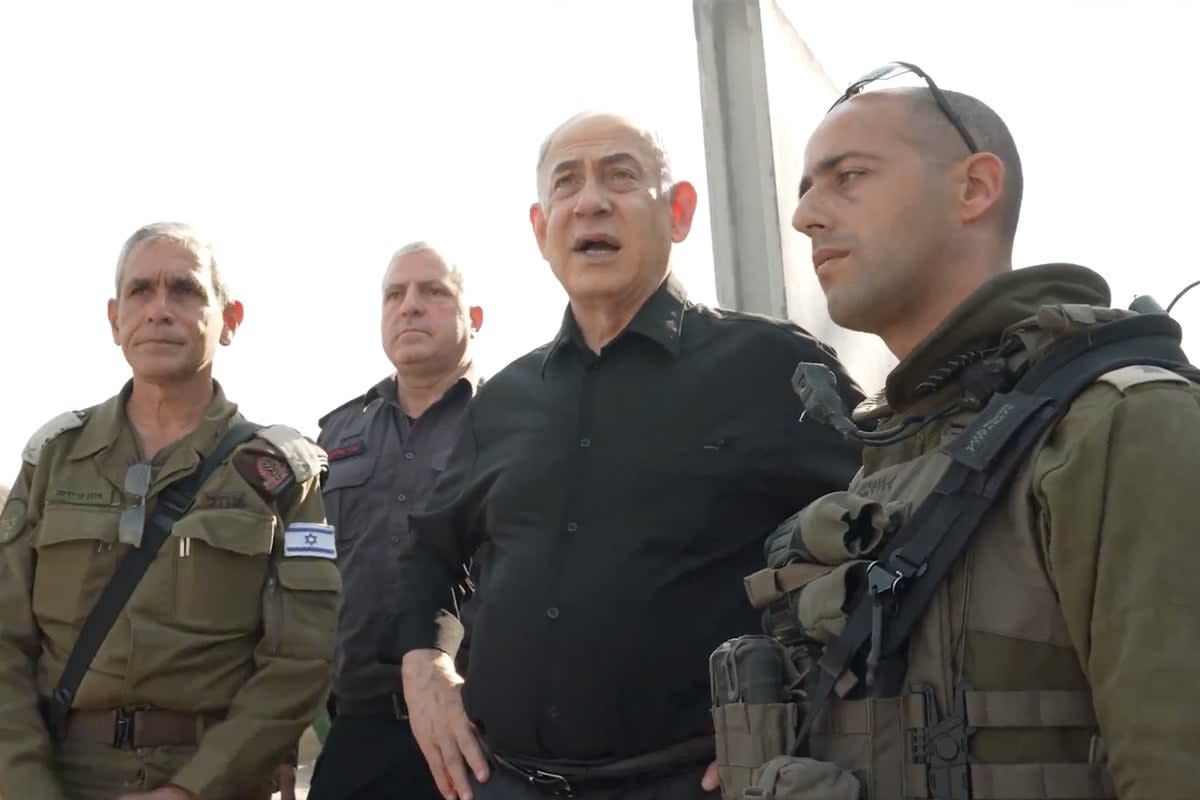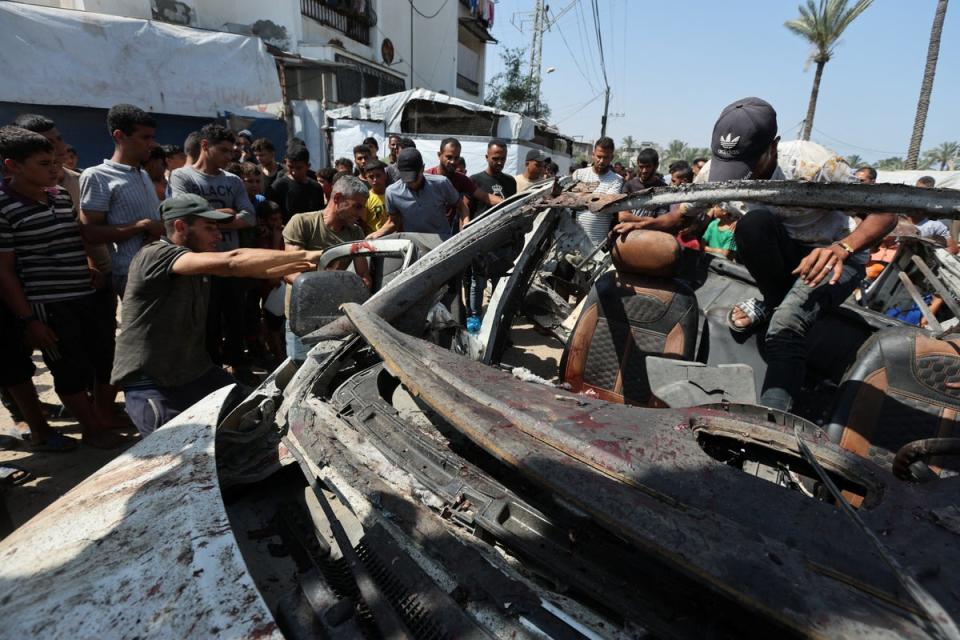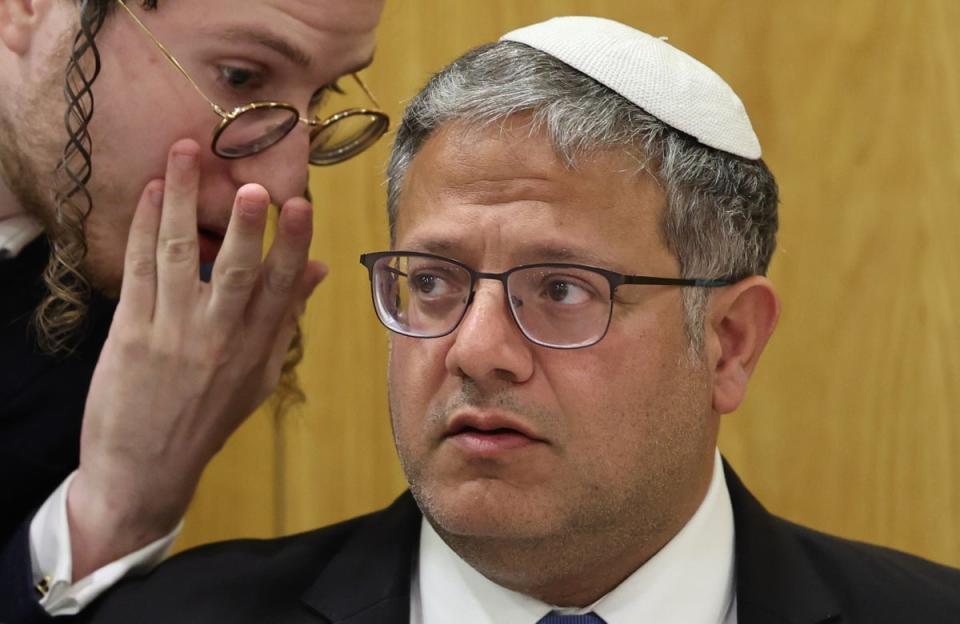Netanyahu vows ‘extremely strong’ response to Hezbollah attacks

Israel’s Prime Minister Benjamin Netanyahu has warned that the military are ready for “extremely strong action” to attacks across the Israel-Lebanon border by Hezbollah.
His comments – made during a visit to northern Israel – come as attacks by the Iran-backed Hezbollah have intensified in recent days, with a wave of attacks setting off massive forest fires that have been fanned by high winds. Many Israeli towns near the border have been evacuated in recent months, with hostilities between Israel and Hezbollah at their worst since a 2006 war.
The exchanges of fire started in the wake of an attack by Hamas – also backed by Tehran – on Israeli soil on 7 October last year that saw 1,200 people killed and around 250 more taken hostage. That attacked triggered an Israeli offensive on Gaza that has killed more than 36,000 people, according to health officials in the Hamas-run strip. The conflict between Hezbollah and Israel, which has been fought in parallel to the Gaza war.
“We said at the start of the war that we would restore security in both the south and the north, and this is what we are doing,” Mr Netanyahu said. “Whoever thinks that they can harm us and we will sit idly by is making a big mistake. We are prepared for a very strong action in the north. In one way or another we will restore security to the north.”
His comments came as the Israeli military began a new campaign against Hamas in central Gaza, launching airstrikes that Palestinian medics said killed dozens of people.

At least 44 Palestinians have been killed in Israeli military strikes in central Gaza Strip areas since Tuesday, health officials in the enclave said. The Israeli military said jets were hitting Hamas militant targets in central Gaza while ground forces were operating "in a focused manner with guidance from intelligence" in the area of Al-Bureij - one of Gaza’s long established refugee settlements.
The attacks took place while ceasefire negotiations continued in the Qatari capital of Doha, and Gaza residents furiously claimed they were being used as bargaining chips while the talks were ongoing.
“Every time they speak about new truce talks, [Israel] uses one town or refugee camp as a pressuring card,” Aya, 30, a displaced woman in Deir Al-Balah, told Reuters. “Why should civilians, people safe inside their homes or tents, pay the price? Why can’t Arabs and the world stop the war?"
The negotiations are being led by officials from the Qatar, Egypt and the US and hope to seal a deal involving the release of Israeli hostages held in Gaza for some of the Palestinians held in Israel jails. CIA Director Bill Burns met with Qatar’s prime minister on Wednesday as part of those talks, according to an official briefed on the negotiations.

It is believed the US are waiting for a response from Hamas, through the Qatari mediators, to the proposal revealed by US President Joe Biden last Friday.
Efforts to wind down the almost eight-month-old war have stumbled over Israel's declared aim of eliminating Hamas as a governing and military force, while Hamas has given no sign it would step down and wants the Israeli offensive called off. "Any negotiations with Hamas would be conducted only under fire," Israel’s defence minister, Yoav Gallant said in remarks carried by Israeli media after he flew abroad a warplane to inspect the Gaza front on Wednesday.
Qatar announced on Tuesday that the proposal was now much closer to the positions of both sides. But a spokesman for Hamas, which has ruled Gaza since 2007, reiterated on Tuesday it could not agree to any deal unless Israel makes a “clear" commitment to a permanent truce and complete withdrawal from Gaza. Is
In signs of a lack of unity among Israel’s ruling coaltion, the national security minister, Itamar Ben-Gvir, a far-right minister, threatened to “disrupt” the government until Mr Netanyahu discloses details of the prospective Gaza deal

Meanwhile, thousands of Israeli police deployed in the streets of Jerusalem on Wednesday for the annual Flag Day procession. The event marks Israel's capture of east Jerusalem, including the Old City and its holy sites sacred to Jews, Christians and Muslims, in the 1967 Middle East war. Thousands of Israelis, including many ultranationalists, took part in the "Jerusalem Day" march.
The march in the past has helped fuel violence, including helping to set off an 11-day war with Hamas three years ago. Palestinians see the march as provocative.
Just before the march began, crowds scuffled with police and threw plastic bottles at at a journalist wearing a Press vest .
Mr Ben-Gvir, who has repeatedly made contentious visits to a sensitive Jerusalem holy site, was expected to join the march through the Old City.
"We are delivering a message from here to Hamas, Jerusalem is ours. Damascus Gate is ours," he told marchers at the start of the rally.
Commenting on the march, Hamas leader Ismail Haniyeh said "our people will not rest until the occupation is gone and an independent Palestinian state is established, with Jerusalem as its capital".
Associated Press contributed to this report

 Yahoo News
Yahoo News 
